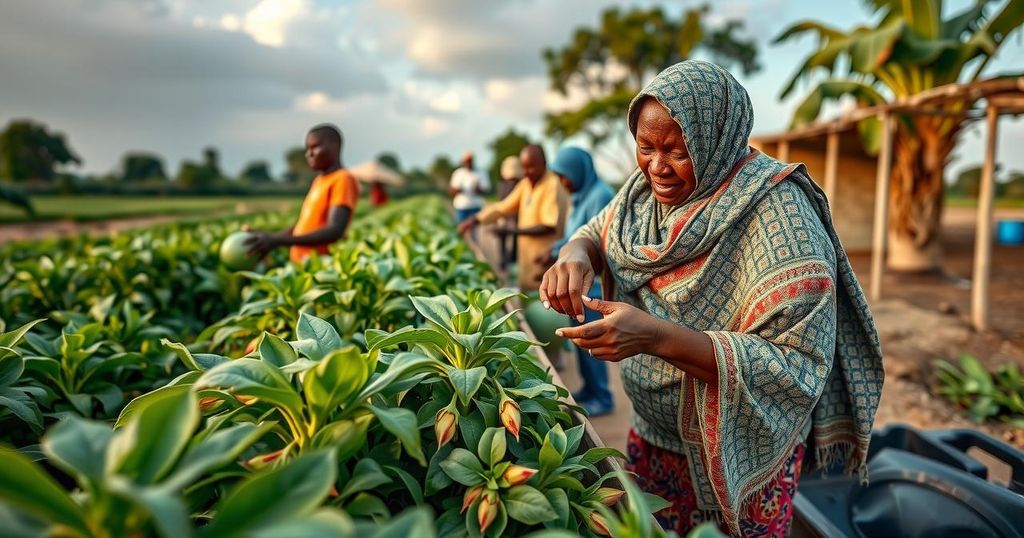Supporting Refugee Farmers in South Sudan Against Climate Change Challenges
Awad Usman, a refugee farmer in South Sudan, faces challenges from climate change, including devastating floods that have previously ruined his crops. With support from UNHCR, he has gained resources and training to enhance his farming practices. UNHCR advocates for increased funding to aid communities affected by climate impacts, emphasizing the importance of sustainable agricultural initiatives to ensure food security and resilience among those displaced by conflict and environmental crises.
In Maban County, South Sudan, Awad Usman, a 37-year-old refugee from Sudan, exemplifies the resilience of refugee farmers confronting the challenges posed by climate change. Every morning, Awad ties a small metal casing containing a prayer to his arm, renewing his hope for better farming outcomes as he grows sesame and sorghum. Having fled conflict a decade ago, he remains committed to his agricultural pursuits despite the recurrent threats posed by seasonal floods, which have devastated his crops in the past. The rising incidents of extreme weather events—flooding and drought—are exacerbating the vulnerabilities of those who have already been displaced by violence. At the ongoing COP29 summit in Azerbaijan, the UN Refugee Agency (UNHCR) has called for increased funding and support for communities like Awad’s, who are critically impacted by the climate crisis. South Sudan ranks among the top five nations most susceptible to climate change, and the local population suffers significantly from fluctuating rainfall patterns and catastrophic floods. Awad recalls the severe flooding events of 2021, which left him with almost nothing to sell or feed his family. He recounts, “After the destruction from the last floods, I had to go to the market and work here, there, and anywhere to cover my family’s needs.” Food insecurity remains a pressing issue affecting both refugees and the host community, as noted by Alex Noel Kilong, an Assistant Livelihoods and Economic Inclusion Officer with UNHCR, who is actively involved in initiatives that address these challenges. To combat the adverse impacts of climate change on agriculture, UNHCR collaborates with partners to provide essential resources to refugee farmers. They have secured land for cultivation, extended financial assistance for seeds and tools, and facilitated training in sustainable agricultural practices. Emphasizing crop diversification is vital to ensuring food security amid unpredictable weather. Furthermore, infrastructure projects, such as building dykes and bridges, shield agricultural lands and improve access to markets and services. This season, with the skills and resources acquired through UNHCR programs, Awad successfully harvested a good yield of sesame before the floods threatened his crops. His investment of hard work in the fields alongside his family is a testament to their commitment to a sustainable agricultural future. “I sing a proud song to my crops, it gives me happiness,” shares Awad, reflecting the deep connection he fosters with his land and its potential to sustain his family in the face of adversity.
The challenges faced by refugee farmers in South Sudan are multifaceted, deeply intertwined with the effects of climate change and the legacy of conflict. South Sudan is among the nations most affected by climatic shifts, such as unpredictable rainfall and increased flooding. Refugees, like Awad Usman, represent a population that is particularly vulnerable to these changes, often lacking the resources and support needed to adapt. The UN Refugee Agency (UNHCR) is actively engaged in initiatives to enhance the livelihoods of these communities through various support programs designed to mitigate the impacts of climate challenges.
The plight of refugee farmers in South Sudan highlights the critical intersection of climate change and human displacement. Initiatives led by UNHCR aim to empower communities like Awad Usman’s through resource provision, training, and infrastructure development, enabling them to adapt and thrive despite environmental adversities. Through collective efforts and adequate funding, it is possible to secure a sustainable agricultural future for those affected, ultimately enhancing food security and resilience among the vulnerable populations in the region.
Original Source: www.unhcr.org




Post Comment